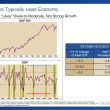by Russ Koesterich, Blackrock
It can be hard to invest rationally when markets are volatile, but Russ is expecting markets to be just that come September. Knowing that market volatility can lead to bad investing behaviors, Russ highlights three behaviors to avoid during the potentially rocky road ahead.
Market volatility is likely to pick up next month for a number of reasons, including increasing investor anxiety ahead of the Federal Reserve’s September meeting.
I’ve already covered how investors can potentially prepare their portfolios for the bumpy road ahead. But many investors may also want to think about how to prepare their investing behavior for more volatility.
As Nelli Oster, an investment strategist on my team, recently wrote in a piece on Seeking Alpha, “3 Behavioral Biases to Watch Out for When Volatility is Back,” it can be hard to invest rationally when markets are volatile. The uncertainty associated with noisy returns data can aggravate certain investing-related psychological judgment errors.
In particular, as Nelli writes, investors may be prone to three bad investing behaviors during periods of higher market volatility.
1. Blindly following others when it comes to making investment decisions. When uncertainty is high, as it is when markets are volatile, investors are more prone to copy the positions of other market participants, who they feel may have better quality information. This kind of behavior can lead to falling victim to market bubbles and crashes.
2. Trading excessively. In general, the higher the uncertainty and volatility in the markets, the harder it is to infer whether one’s own past investment decisions were correct. During volatile periods, investors may remain overconfident longer than if they were able to more clearly learn their true investing skill level. As such, amid volatility, they may continue to trade excessively longer than they otherwise might, potentially hurting portfolio performance net of fees.
3. Remaining paralyzed in the status quo. While some individuals may trade excessively during volatile times, others, especially those with little investment experience and little confidence in their own investing abilities, may not wish to act at all. This is because they may fear potential losses, which loom larger during times of uncertainty, and the psychological pain from regret over any poor investment decisions.
The good news, as Nelli points out, is that investors can take steps to potentially avoid such errors when volatility picks up. Nelli’s suggestions for weathering volatile times rationally include focusing on longer-term investment goals, portfolio diversification and regular portfolio rebalancing at set intervals.
Russ Koesterich, CFA, is the iShares Global Chief Investment Strategist and a regular contributor to The Blog. You can find more of his posts here.
Source: BlackRock research, “3 Behavioral Biases to Watch Out for When Volatility is Back,” on Seeking Alpha
Diversification may not protect against market risk or loss of principal.
Copyright © Blackrock














